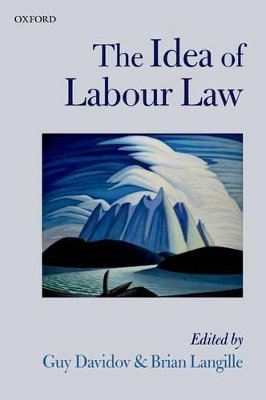
The Idea of Labour Law
Oxford University Press (Verlag)
978-0-19-966945-5 (ISBN)
Labour law is widely considered to be in crisis by scholars of the field. This crisis has an obvious external dimension - labour law is attacked for impeding efficiency, flexibility, and development; vilified for reducing employment and for favouring already well placed employees over less fortunate ones; and discredited for failing to cover the most vulnerable workers and workers in the "informal sector". These are just some of the external challenges to labour law. There is also an internal challenge, as labour lawyers themselves increasingly question whether their discipline is conceptually coherent, relevant to the new empirical realities of the world of work, and normatively salient in the world as we now know it.
This book responds to such fundamental challenges by asking the most fundamental questions: What is labour law for? How can it be justified? And what are the normative premises on which reforms should be based? There has been growing interest in such questions in recent years. In this volume the contributors seek to take this body of scholarship seriously and also to move it forward. Its aim is to provide, if not answers which satisfy everyone, intellectually nourishing food for thought for those interested in understanding, explaining and interpreting labour laws - whether they are scholars, practitioners, judges, policy-makers, or workers and employers.
Guy Davidov is Elias Lieberman Chair in Labour Law at the Hebrew University of Jerusalem. He studied at Tel-Aviv University (LLB) and the University of Toronto (LLM, SJD) and has previously been a faculty member at the University of Haifa, before joining the Hebrew University in 2007. He served as Vice-Dean from 2009 to 2011 and is currently head of the Graduate Programs. He is co-editor of the Israeli journal Labour, Society and Law, and chairs the Steering Committee of the recently founded Labour Law Research Network. He has published widely on labour law issues, especially dealing with the normative justifications for different labour regulations. Brian Langille is Professor of Law at the University of Toronto. A native of Nova Scotia, he received a B.A. from Acadia, his LL.B from Dalhousie Law School, and the B.C.L. from Oxford. He taught at Dalhousie Law School prior to joining the University of Toronto in 1983. His numerous publications are concerned with labour law and legal theory. Professor Langille has been appointed a Visiting Professor or Fellow at The International Institute for Labour Studies, the European University Institute, the Centre for Transnational Legal Studies in London, Dalhousie Law School, University Pompeu Fabra, the Institute for Advanced Studies of Nantes, and the University of Melbourne Law School. He has also been a member of the executive of the International Society for Labour Law and Social Security and he is an editor of the International Labour Law Reports.
Understanding Labour Law: A Timeless Idea, a Timed-Out Idea, or an Idea Whose Time has Now Come? ; THE IDEA OF LABOUR LAW IN HISTORICAL CONTEXT ; 1. Labour Law After Labour ; 2. Factors Influencing the Making and Transformation of Labour Law in Europe ; 3. Re-Inventing Labour Law? ; 4. Hugo Sinzheimer and the Constitutional Function of Labour Law ; 5. Global Conceptualizations and Local Constructions on the Idea of Labour Law ; 6. The Idea of the Idea of Labour Law: A Parable ; NORMATIVE FOUNDATIONS OF THE IDEA OF LABOUR LAW ; 7. Labour Law's Theory of Justice ; 8. Labour as a 'Fictive Commodity': Radically Reconceptualizing Labour Law ; 9. Theories of Rights as Justifications for Labour Law ; 10. The Contribution of Labour Law to Economic and Human Development ; NORMATIVE FOUNDATIONS AND LEGAL IDEAS: RETHINKING EXISTING STRUCTURES ; 11. Re-Matching Labour Laws with Their Purpose ; 12. The Legal Characterization of Personal Work Relations and the Idea of Labour Law ; 13. Ideas of Labour Law - A View From the South ; 14. Informal Employment and the Challenges for Labour Law ; 15. The Impossibility of Work Law ; 16. Using Procurement Law to Enforce Labour Standards ; 17. Labor Activism in Local Politics: From CBAs to 'CBAs' ; NEW LABOUR LAW IDEAS: RETHINKING EXISTING BOUNDARIES ; 18. The Broad Idea of Labour Law: Industrial Policy, Labour Market Regulation, and Decent Work ; 19. The Third Function of Labor Law: Distributing Labor Market Opportunities Among Workers ; 20. Beyond Collective Bargaining: Modern Unions as Agents of Social Solidarity ; 21. From Conflict to Regulation: The Transformative Function of Labour Law ; NEW IDEAS OF LABOUR LAW FROM AN INTERNATIONAL PERSPECTIVE ; 22. Out of the Shadows? The Non-Binding Multilateral Framework on Migration (2006) and Prospects for Using International Labour Regulation to Forge Global Labour Market Membership ; 23. Flexible Bureaucracies in Labor Market Regulation ; 24. Collective Exit Strategies: New Ideas in Transnational Labour Law ; 25. Emancipation in the Idea of Labour Law: Commoditization, Resistance and Distributive Justice beyond borders
| Verlagsort | Oxford |
|---|---|
| Sprache | englisch |
| Maße | 173 x 234 mm |
| Gewicht | 682 g |
| Themenwelt | Recht / Steuern ► Allgemeines / Lexika |
| Recht / Steuern ► Arbeits- / Sozialrecht ► Arbeitsrecht | |
| Recht / Steuern ► EU / Internationales Recht | |
| ISBN-10 | 0-19-966945-7 / 0199669457 |
| ISBN-13 | 978-0-19-966945-5 / 9780199669455 |
| Zustand | Neuware |
| Haben Sie eine Frage zum Produkt? |
aus dem Bereich


